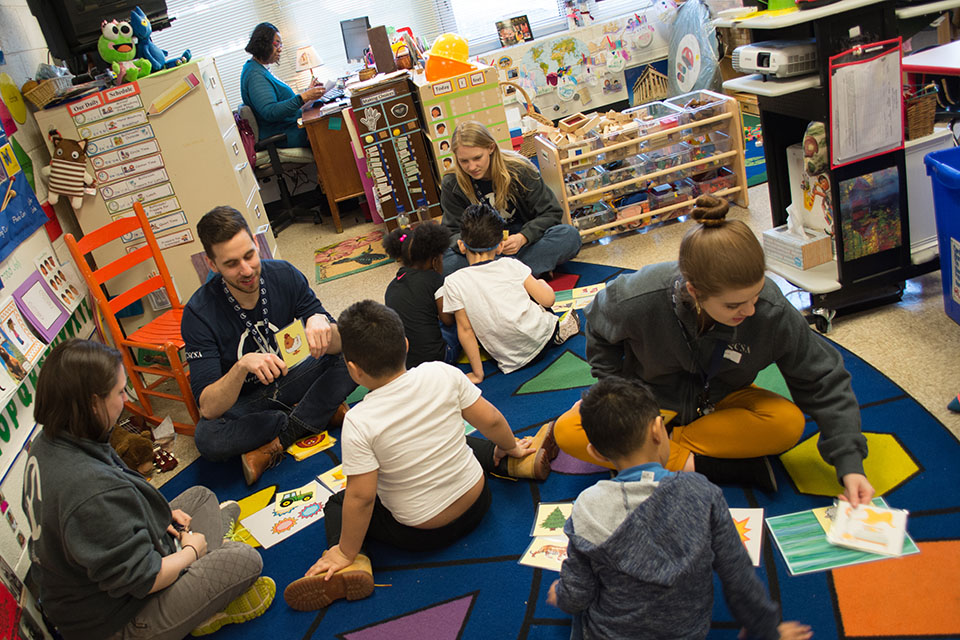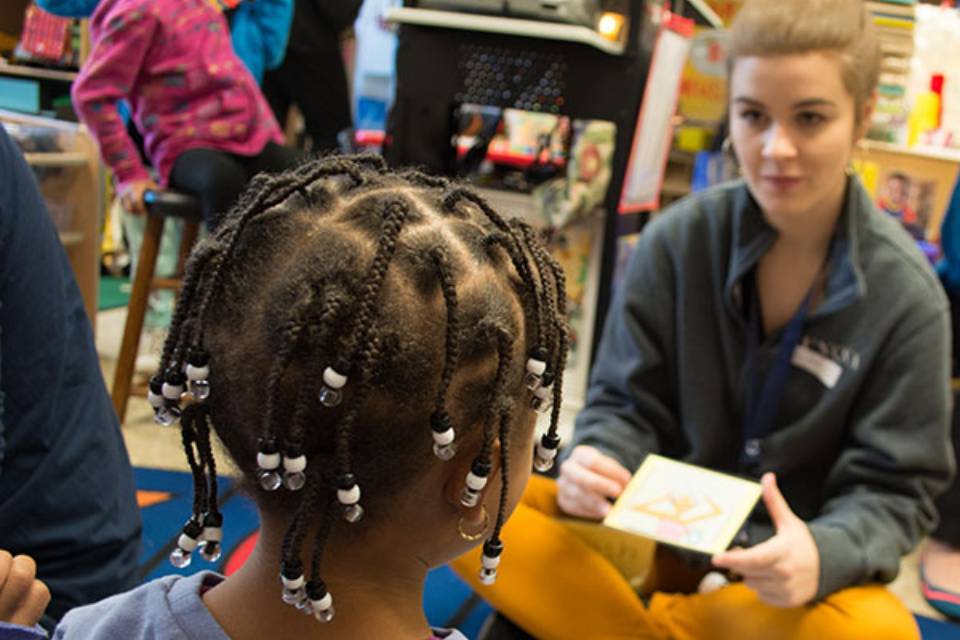B-b-bunny: A New Approach to Pre-K Phonics (Part 1)
Author: Kendra Harding
The cold, rainy weather doesn’t dampen the energy inside Easton Elementary. Students dart back and forth, brightly-colored oversized backpacks bouncing wildly as they run. I make my way through the lobby to a long outdoor corridor that leads to the building where the pre-k classrooms are. The building is old, with fluorescent lighting and worn tile floors, but inside the classrooms students are buzzing with life, enthusiasm, and all sorts of sounds. This is where one team of ArtistCorps members brings learning to life through the Wolf Method, a pilot program designed by drama faculty and seasoned ArtistCorps member Ann-Louise Wolf.
 Image Credit: Haydee Thompson
Image Credit: Haydee Thompson
I weave my way through knee-high tables and chairs marked with the names of students, and find a seat on a carpet decorated with shapes and colors. In a few moments, students are all around me, seated crisscross on purple ovals, red squares, and yellow stars.
ArtistCorps member Daniel Kane begins the day by leading the group in a review of all of the sounds they’ve learned to make this year, beginning with band p, then moving to sounds made with the back of the tongue like gand k, and ending with sounds like sand sh. Then he pulls out percussion instruments: a hand drum, egg shaker, castanets. Each student is allowed to choose an instrument to play, but first they must make a sound associated with it. For example, the hand drum is a bsound like in “bunny.” Most of the children enthusiastically play the instruments, make the sounds, and say the words. Others, Daniel gently coaxes into participation, praising them for their effort when they barely whisper “b-b-bunny.”
In these sessions, ArtistCorps members use their arts training to enrich students’ lives by helping them develop crucial pre-reading skills.
ArtistCorps member and drama student Sam Sherman says that the program has allowed him to bring his training from UNCSA into the classroom and helped him develop the ability to creatively adapt to students’ needs.
“Helping the kids learn phonetic sounds has helped me get a better grasp over those same sounds, how they are made, and where they are located in my body.” Sam explains that this is an important element of mastering his craft as an actor. “I have to know a lot of this material in order to transcribe monologues for my accents class and translate sounds into the International Phonetic Alphabet. It's been very helpful.”
His improvisation training has also come in handy when working with the kids.
“One day, I was playing our phonetics card game with a student. He was having trouble
focusing,” he explains. “I began to challenge him to play as fast as possible without
guessing. He managed to correctly place each of my yellow cards on their corresponding
larger card with minimal guessing involved. It was really exciting and affirmed that
it’s just a matter of tapping into what makes them tick.”
School of Music graduate Peyton Marion agrees that service has given her the opportunity
to use her training as an artist in different ways than many would expect.
“We think really narrowly about what arts outreach is. The integration aspect of it
is way more important and underrepresented. Typically for singers you think ‘Oh we’ll go to a school and we’ll sing for them.’
But this is something really different and you can see a lasting impact using the
skills you have.” 
Once warmups are done, it’s time to work with the cards Peyton pulled for the day. There are two sets: large cards with pictures of tongues and lips, and smaller yellow cards with images of things like mice, lightning, or lollipops. Students work one-on-one with ArtistCorps members to sort the smaller cards onto the larger cards based on where the sounds in those words are made in the mouth.
Most of the students treat it like a game, trying to “beat” the ArtistCorps members by sorting the sounds correctly. It’s all grins and high fives. They’ve played this game a hundred times, but the new sounds and cards keep their victories exciting and fresh.
While the Wolf Method is doing a lot to change children’s lives, ArtistCorps members are being changed as well. Maddie explains that her service has been eye-opening, and helped shape her perspective of her role as an artist in her community.
“It’s hard being a student. You’re really isolated to campus and I was not aware of the community around me,” she says. “This has given me a perspective on what’s actually happening in Winston and what our role is as a part of this community.” Furthermore, she says it’s shaped her career goals in some unanticipated ways.
“I’m interested in transitioning into theatre management and arts administration. I’ve applied to a lot of internships and I’ve specifically looked at places that are non-profit and give back to the communities that they’re in. I think that’s just such an important aspect of what we do as artists, to not only focus on ourselves but to focus on the communities around us.”
The team believes in the value of the work they do as ArtistCorps members, and hopes to see the program continue to flourish. Sam says making learning fun has the potential to profoundly impact students’ lives.
“The more fun they can have as they learn, the more care and drive they'll invest in their learning time. The longer this can be sustained, the more positivity they'll associate with school. There may be a better chance of these same kids being able to carry on with their learning in a positive, fruitful way, through their time at Easton and beyond.”
Peyton echoes this sentiment, saying that the symbiosis of arts and literacy creates a perfect recipe to keep kids interested in the work they’re doing.
“This service is important because it’s based in arts education andit’s focusing on literacy readiness so it’s giving them both at the same time and combining them in a way that’s engaging.”
Maddie believes that they bring a critical piece of awareness to the students they serve.
“We’re giving these kids an awareness that in Spanish there are five vowels and in English there are twenty. We are helping prepare them for reading. I think it’s really important that we’re giving them a foundation that’s going to help them succeed in the long run.”
March 27, 2019





